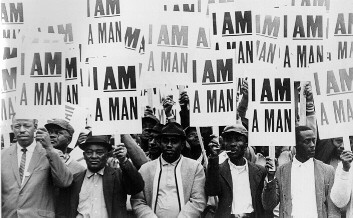
Fifty years ago this week, Martin Luther King Jr. stood on the steps of the Lincoln Memorial. He spoke then with such eloquence that his words would, by the time of my childhood, enjoy greater familiarity among schoolchildren than even those in whose presence he stood — the emblazoned text of the Gettysburg Address.
King’s subject was prescient for the setting. The dream of which he spoke gave tangibility to what in our history has too often been a conveniently vague notion of government of, by, and for the people. The rest, of course, is history. King was murdered in Memphis; he had come to support city sanitation workers in their fight to unionize. Ultimately, the workers prevailed and Council 1733 of the American Federation of State, County and Municipal Employees (AFSCME) was recognized. By that time, however, King was a martyr.
This week, the Memphis City Council had before it an ordinance for proposed changes to city sanitation operations. The changes in question were jointly endorsed by Mayor A C Wharton’s administration and the AFSCME union representing the sanitation workers.
For those not current on Memphis budget minutiae, let me give the Cliff’s Notes version: Over the past several months, AFSCME and members of the administration have been negotiating the details of the aforementioned proposal — a true compromise. There were benefits and concessions on both sides.
Solid-waste operations of the Department of Public Works, funded strictly from monthly residents’ fees, stood to generate much-needed capital by operational changes — including the consolidation of route schedules. Responsibility for collecting routine garbage and that of picking up recyclable items would no longer be divided. And new, larger recycling containers would be furnished for city residents.
Clearly, the agreement spelled more work for employees in the field. AFSCME professed itself willing to accept these changes on the condition that a portion of the departmental savings achieved thereby would go to the funding of a supplemental retirement account for sanitation workers 65 years or older.
Up until now, Memphis sanitation employees have not benefited from the same pension system enjoyed by most other municipal employees. Upon retirement, the great majority of these individuals stand to receive only Social Security. As a result, men well into their 70s and even 80s continue to work the refuse collection routes. They work, because, lacking city pensions, they cannot afford to retire.
As presented to the council, the proposed plan would provide eligible sanitation workers, 65 and older, with a maximum monthly benefit up to $1,000. This isn’t enough to move to Boca Raton, but as a supplement to Social Security, it should at least provide some measure of dignity and security.
The plan, which would result in a savings to the city of almost $5 million annually, would call for restoring solid-waste fees paid by Memphis residents to a former level of $25.05 a month, representing an increase of $2.25 per month for what would be a modernized, more efficient trash-collection process — and one that would certainly be more equitable to those providing the service.
At a Monday signing ceremony that outlined the details of the joint administration/AFSCME proposal, Wharton said he could think of no more fitting tribute our city could make to Dr. King.
As I write this, the agreement is subject to challenge by the city council, and acceptance, rejection, or modification of the proposal are all live options.
As both a paid consultant to the process and a firm believer in the resulting agreement, I am proud simply to have been a participant. Indeed, this process itself has been a tribute to King’s legacy — significant because when King came to Memphis in 1968, he came to stand alongside workers fighting to organize and, through collective bargaining, achieve some meaningful measure of self-determination. Their overriding objective was not so much a bigger piece of the pie as it was a meaningful and permanent place at the table.
The joint proposal for sanitation, the collaborative process through which it was achieved, the growing sense of trust thereby forged between the administration and AFSCME, and the prospect of continued cooperation between city and labor leadership collectively demonstrate progress. In particular, the productive, ongoing, results-oriented collaboration between AFSCME and the administration demonstrates that AFSCME indeed has won a seat at the table of city government.
Win or lose before the council, we have reached this point and come far. That alone is evidence enough that Dr. King — to borrow another phrase from Gettysburg — did not die in vain.
Jake Brown is associate director of Elizabeth Rincon and Associates, which consulted on the proposed AFSCME/city agreement.